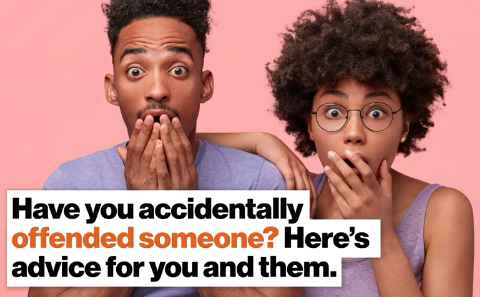Human beings have blind spots.
人类有盲点
They have implicit biases.
他们有隐性偏见
This doesn't mean you're a bad person.
这并不意味着你是个坏人
We all have them.
是人就会有隐性偏见
And I think it's an illusion to think we can eradicate them from human beings.
想要根除人类的隐性偏见只是个妄想
And this relates to civil discourse because it's important that people be allowed to think out loud and make mistakes because,
这与国民论述有关 因为允许人们大胆思考和犯错很重要
particularly in diverse work environments, diverse college classrooms,
尤其是在多样化的工作环境和大学里
people are going to come from different backgrounds, and they will say things that may offend someone.
毕竟人们来自不同的背景 可能会说出些冒犯他人的话

And there, I think it's extraordinarily important that we tell our students, that this may happen,
所以我们一定要告诉学生们 可能会出现这种情况
but it's immensely important that if you offend someone inadvertently that you apologize and say 'That was not my intention.'
但如果你不经意间冒犯了他人 一定要向他道歉 并说明“那不是我的本意” 这一点很重要
And then hopefully we can move on.
但愿大家都能既往不咎
In my classroom, I do this, I say, I want you to speak freely.
在我的课上 我会告诉学生们 希望大家能自由发言
I don't want you to censor yourself.
不要压制自己的想法
But if anybody feels offended, they should speak up because that's not a good classroom environment,
但如果有人觉得自己被冒犯了 应该大声说出来 因为有人被冒犯的教学环境并不友好
and we apologize, and we move on.
然后冒犯他人的人应该道歉 咱们继续向前
And I think this is a really simple truth that apologizing and moving on is a real foundation for moving forward.
道歉和既往不咎是我们继续向前的实际前提 这是个很简单的事实
And I am always suspicious of someone who's unwilling to apologize for inadvertently offending someone.
我经常会质疑那些无意间冒犯了别人却不愿意道歉的人
And another thing I would say is we need to be more generous with our fellow humans.
我想说的另一点是 我们应该对自己的同胞多些宽容
I see, in a variety of environments, someone -- you see it with the presidential campaign right now.
在各种环境中 我都看到当某个人——大家可以在正在进行的总统选举运动中看到这种现象
Someone says something, and there's a chorus of voices that say, 'How could he say that?'
当某个人说出某个观点 就会有一群人齐声质问 ‘他怎么能说出那种话?’
They want to call him out, him or her out, say that that's absolutely -- by saying something that offends someone,
他们想要淘汰他 淘汰他或她 觉得那绝对——就因为说了一些冒犯到别人的话
you're automatically disqualified from continuing in the discussion,
你就自动失去了继续参与讨论的资格
and I think that's a terrible example to give our children, to give our students that one mistake and you're out.
我觉得这给我们的孩子和学生树立了很坏的榜样 就因为犯了个错你就被踢出局了
And the presumption there is that you can't learn from your behavior.
人们想当然地以为你不会吸取教训
And it's extraordinarily important if we're going to work together, for us to be able to be a little bit more forgiving than that and realize that --
如果我们想要一起共事 宽容对待他人非常重要 并且要知道——
and I know this could be immensely frustrating, right?
我懂 有时候真的很沮丧 对吧?
If you're a member of a marginalized group who's repeatedly offended, you just get sick of it.
如果你是被边缘化的群体中的一员 经常会被别人冒犯 实在忍无可忍
You get sick of people doing the same things over and over again that you find offensive.
你受够了人们一遍又一遍以同样的方式冒犯你
So I get that you can become frustrated with it.
所以我很理解你的沮丧
But I have also seen instances where humans can learn over time, and I think that has to be our aim.
但我也知道很多例子 慢慢人们会吸取教训的 这就是我们的目标
At least it's my aim as an educator to help people learn to be more aware of their implicit biases.
至少这是我作为教育家的一个目标 帮助人们更好地意识到自己的隐性偏见
I guess I would add to that that human beings in a diverse society need to realize that they're human
我想增加一点 生活在多样化社会中的人们需要意识到 大家都是人类
and that they're going to make mistakes and they are going to have to allow others to make mistakes.
是人就会犯错 而且我们要允许别人犯错
And the way we, in a sense, meet halfway on that is to be committed not to offending one another --
在某种意义上 我们折中的方式就是 不要互相冒犯——
not to self-censoring, making sure we're going to always say the right thing,
不要自我审查 确保自己说出来的话一定是正确的
but to being self-aware enough to realize that when we've offended someone, it's a moral imperative to apologize.
而是应该有足够的意识 记住当我们冒犯他人的时候 道歉是一种道德责任











